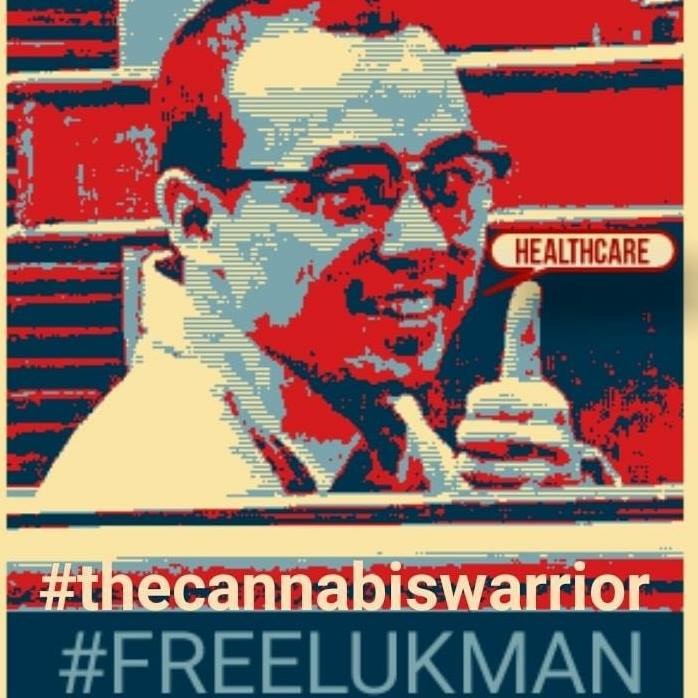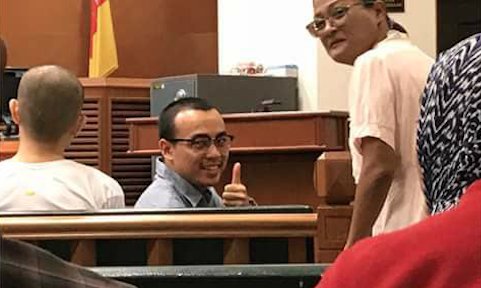Muhammad Lukman, a 29-year-old father of one, has been sentenced to death by hanging after being found guilty of possessing and distributing cannabis oil to patients for sundry ailments.
On Dec. 7, 2015, police raided his home, where he lived with his wife, who was six-months pregnant at the time, and found him to be in possession of 3.1 liters of oil containing THC, 1.4kg of a substance containing THC, and 279g of cannabis. Tetrahydrocannabinol, aka THC, is the principle psychoactive substance found in cannabis.
Using the Facebook page HealTHCare, Lukman’s lawyer maintains that he sold the substance not for mind-altering effect, but to be used medicinally. In fact, he occasionally collaborated with GENGGAM (Malaysia Ganja Education Movement) to educate consumers on the benefits of medical marijuana usage in easing debilitating conditions such as chronic pain, nausea related to chemotherapy, and lack of appetite due to HIV/AIDS.
Two patients appeared in court to the suspect’s defense, one of them a Thalassemia (a blood condition that causes fatigue) patient who had been using the oil as a remedy for his symptoms, and Lukman’s mother, who used the oil in assuaging an illness she had. In total, Lukman had given and sold his oil therapy to almost 800 patients.
However, trafficking of cannabis in any form is an offense under Section 39B of the Dangerous Drug Act, and neither the Malaysian government, nor the Malaysian medical board, recognize cannabis oil for its medicinal qualities.

Coconuts KL was able to speak to Lukman’s lawyer, Farhan Maaruf – a man whose WhatsApp status declares: If you’re a criminal, I’m your best friend.
Farhan’s defense was largely based on the fact that Lukman was no drug kingpin, just a man trying to help those in need. Anyone who didn’t have the money to pay him for the oil could have it for free, they told the judge.
In a court of law, altruism is rarely a get-out-of-jail card, and the judge agreed that whatever the intent was, the fact still remained that drug laws were broken.
Farhan’s main point of contention, however, has always been that the collection of evidence, and its subsequent testing failed to follow protocol, and that university testing facilities lacked the proper equipment to measure the oil his client sold.
He pointed out that in the case of syabu (a form of methamphetamine), the chemical composition of the drugs seized will normally be tested by chemical laboratories. From there, they will break down how much amphetamine the substance contains and use those numbers for the charge.
In this instance, the court-appointed expert has not gone through that process, maintaining that any trace of THC is enough, a fact that means Lukman is being charged for the full three liters of oil found at his home.
An expert called to testify for the defense from University Putra Malaysia said that more precise measurements need to be taken, explaining that the equipment used could not accurately measure the actual amount of THC in the batch, and thus saying it was “three liters” was inaccurate.
The judge, however, argued that their court-appointed chemist was the ultimate “expert,” and that his calculations should remain on the record as evidence.
Police handling of evidence, including the fact that the officer who collected the cannabis during the raid could not recall where he found the drug, was also questioned. Farhan explained that when evidence is seized by police, it must be properly logged: Named, dated, and signed off on. None of this was done.
Again, the judge agreed in favor of the prosecution, telling the court that the civil servant had “no reason to lie.”
Bleak, yes, but Farhan is not giving up, insisting that his client’s appeal will bring up each of the following issues: The lack of accurate THC measurement, the mishandling of evidence, and the fact that the court “expert” admitted it was the first time they had dealt with THC.
What about the nearly 800 people that Lukman sold to? There must be some compelling stories there, to sway court opinion.
“It’s irrelevant,” he told us. “Cannabis oil isn’t recognized as a treatment under Malaysian law.”
Lukman now sits in a Kajang prison cell, awaiting his appeal, and whether he’ll face the gallows.
His legal team have set up a Go Fund Me page, asking for help towards his fees in pursuing his pardon. You’ll find it here.




